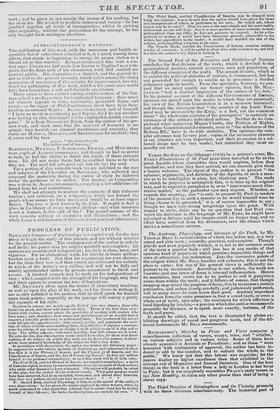PROGRESS OF PUBLICATION.
NEWMAN'S Grammar of Entomoloszy is a capital work for the tyro about to begin the study of this pursuit, and not without interest for the general reader. The arrangement of the author is orderly and lucid ; his power over his subject masterly and complete; his opinions are sensible and independent; his style is clear, terse, and vigorous. For an elementary work, his brevity at times perhaps "borders upon a fault. Not that his expressions are ever obscure, but the ideas they now and then convey arc addressed too entirely to minds of the writer's own calibre, and will not be fully and readily apprehended unless by persons accustomed to think and reason. A kindred remark may be made on his independence of view ; whieb,coupled with the strength of his language, may here and there appear to assume the tone of dogmatism.
Mr. NEwsisses ideas upon the matter of elementary teaching, as well as upon the plan of his work, and his views in writing it, are so ably unfolded in his preface, that he shall speak for himself upon these points; especially as the passage will convey a pretty Lir example of his style.
Teachers in science are nearly equally divided into two classes ; those who know too much, and those who know too little. Those of the first class, over- loaded with science, cannot admit the possibility of meeting with readers who have none ; and, therefore, their essays and introductions are so worded that it requires a tolerable proficiency so understand them. The teachers of the second class fall into the opposite error ; they curtail, garble, and popularize the writ- ings of others without understanding them, forgetful that it requires a consum- mate knowledge of any science to abridge a work which treats of it ably and at large- The author sutruits, with much humility, that both classes are in error. ti., He submits also, that in roductotv works should be written fur those who know nothing of the subject °k which they read, and by those who possess, in them- selves, sonic practical knodddddddedge of the subject on which they write. In accordance with these views, the author has written the following pages : be supposes his reader utterly ignorant cf Entomology, and endeavours to show him that it is the History of Insects,. and thiPhysiol gy of Insects, and the Classification of Insects, and the Art of Preserving. Insects: he dues not address himself to the professed entomologist ; to such this work will be of little value. The First Book, entitled History of Insects, is a complete compilation ; a series of histories copied, in many instances verbatim, from the accounts of those authors who relate what themselves have witnessed. Objections will probably be raised to this plan, but the author thinks without reason. What good purpose would have been answered, had he so curtailed, transposed, and altered these histories,
that their very authors should not have known them ? * • *
T: 7 Second Book, entitled Physiology of Insects, is the record of the author's own observations: he has given the names employed by other writers, when he could understand to what parts they referred, but in names alone has he availed himself of their labJurs ; the facts, the de-seriptious, are entirely his own. ' • The Third Beek, entitled Classification of Insects, may be charged with being too original : it may be said that the author should have given the views and arrangements of others in preference to his own. He would ask, whose system was he to select? That his own is the most simple and the most readily understood, no one will deny : that it is more perfect, or more accurate, or Mere philosophical than any ether, he does not presume to contend. As for a dis- quisition on system, it would have been dangerous ground ; pleasurable to the writer, but unprofitable to the reader ; it would have doubled the size of the volume, without adding a fraction to its value. The Fourth Book, entitled the Preservation of Insects, contains nothing worthy of comment : it will be useful to those who wish to =keit so, and that has been the author's only object iu writing it.


























 Previous page
Previous page